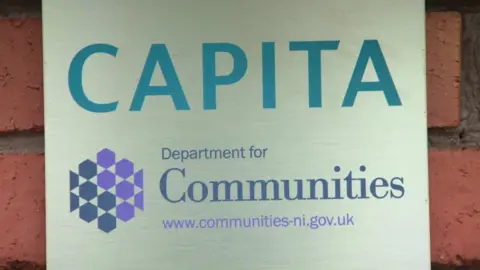PIP disability benefit: Concerns raised over NI assessments
 BBC
BBCMore than 12,000 people in Northern Ireland have challenged the Department for Communities over the outcome of their initial PIP assessment.
Personal Independence Payment (PIP) is a new benefit that is gradually replacing Disability Living Allowance (DLA).
It was introduced in Northern Ireland last year.
PIP is harder to get than DLA because it places less importance on your diagnosis.
It focuses instead on how well you can function on a a day-to-day basis.
More than 125,000 people in Northern Ireland will have to be re-assessed to see if they qualify for the new benefit.
BBC Spotlight has obtained figures that shows that over 35% of applicants seeking to transfer from DLA to PIP have had their benefits disallowed on the basis of their initial assessment.
Many of these people have gone on to apply for what is called a mandatory reconsideration.
It is the first part of the appeals process and it is where you ask the department to look at your case again.
But the programme also discovered that only 20% of those who apply for a mandatory reconsideration will have their decision changed.

Capita is the private company who won the £65m contract to deliver PIP in Northern Ireland.
Simon Matchett from Bangor had been diagnosed with Multiple Sclerosis and was getting high-rate DLA that allowed him to get a Motability car.
Following his assessment he was awarded eight points, which was not enough to keep the car and he had to return it.
Mr Matchett said when he was reading his assessment he queried a number of things that were written in it.
"That didn't happen, I didn't actually say that - a lot of times it could come down to a he said, she said sort of thing," he said.
"The title is personal independence payment and by taking away my car, they were taking away my ability to have a little bit of independence."
Mr Matchett challenged the decision based on what he claimed were inaccuracies in his report.
He was later awarded the extra two points during the mandatory reconsideration stage.

If you are unsuccessful at the mandatory reconsideration stage, you can ask for an appeal hearing during which you will present your case to a legal expert and a disability expert.
Jylette Frey-Pullan, who has muscular dystrophy and uses an electric wheelchair, was also told that she no longer qualified for a Motability car.
She said the car was her lifeline as it was able to hold her electric wheelchair and her husband was able to drive her around in it.
Mrs Frey-Pullan said she was shocked when the initial decision letter arrived.
"I thought no, this must be some kind of mistake. They can't be talking about me, there were a lot of inaccuracies," she said.
At a mandatory reconsideration, her request for a car was again turned down.
Like many others in the same situation, Mrs Frey-Pullan is now waiting for a date for her appeal.
Shea Ross, a tribunal representative at the Citywide Tribunal Service, has said they have seen a huge increase in demand for their services.
"No one that we speak to is happy with the assessments, usually what they say is that either their words were twisted, or that some of the things in the assessment were just fabricated."
So far just over 1,000 people have completed the full appeals process. More than one in three have been successful.

The main concern for claimants is that what they say during their assessments is not always being represented in the final report sent to the department.
Owen McCloskey, from the Law Centre NI, said "a serious issue that we feel we have identified is the auditing of reports and potentially changes being made to the report without clients being made aware of it".
"We are looking for copies of each version of the audit report, so before and after it has been edited," he said.
"It may have been edited multiple times.
"We are also looking for access to the actual audit document, so where the auditor has assessed the report, they have identified quality issues and they have made recommendations for change.
"It's important we see that actual document."

John Duffy, the president of the Appeals Tribunal, has written to Spotlight to say that tribunal members have "expressed concerns about the auditing practices" and that he had been in contact with the department about the issue.
He added that if all information is not made available at a tribunal, people can "ask for the decision to be set aside and reheard".
When Spotlight asked the department about this, it said arrangements were now in place to facilitate earlier versions of the report being made available.
Civil servant Paul Gray was commissioned by the government to examine how the new PIP system was working in the rest of the UK.
With PIP still in its early stages in Northern Ireland, Mr Gray thinks the project should be reviewed before it gets much further.
"Since my reviews didn't cover Northern Ireland then, yes, I think it would be a very good idea for somebody to take a look at that," he said.
Justin Tomlinson MP, former minister for disabled people, said PIP is a "much, much better benefit than DLA".
"Through the introduction of personal independence payments we are getting more people accessing the higher rate of benefits," he said.
"The PIP process is recognised to be much more thorough, much more able to identify individual challenges, it means we're spending £3bn a year more, so more money is going to some of the most vulnerable people in society but it's not a completed project."

Spotlight has also been told by the Information Commissioner that they have received a number of complaints about Capita and the department and are looking into the details.
Capita said Spotlight did not provide them with enough personal information about Mr Matchett or Mrs Frey-Pullan to be able to comment on their cases.
They added that they had a robust auditing process in place to ensure a high quality of assessment and said their staff are healthcare professionals who are trained and empathetic.
In a statement the Department for Communities said:
"Whilst it is still very early days for PIP in Northern Ireland, the recently published information shows that 29% of PIP recipients are getting the highest level of benefit compared to 15% of the working-age DLA customers prior to its introduction."
